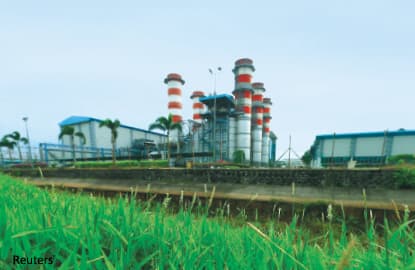
TENAGA Nasional Bhd (TNB) has lost a private arbitration with Kuala Langat Power Plant Sdn Bhd (KLPP) to the tune of about RM200 million, including interest, industry sources tell The Edge.
KLPP is a 720mw combined cycle gas turbine power plant in which Edra Global Energy Bhd (a former unit of 1Malaysia Development Bhd) holds a 75% stake. Edra Global is currently owned by China General Nuclear Power Corp (CGN).
The remaining 25% stake is held by Selangor investment vehicle Worldwide Holdings Sdn Bhd.
The dispute dates back more than a decade, with KLPP claiming witheld payments from TNB, stemming from differing interpretations of KLPP’s power purchase agreement (PPA).
If TNB pays up, it would be a huge windfall for CGN and the Selangor government. KLPP currently generates over RM90 million in profit each year. Furthermore, the bulk of the disputed sum has long been written down in KLPP’s accounts, say sources.
TNB and Edra Global declined to comment on the matter when contacted.
TNB, however, may not fork up the cash in a hurry. At press time, the national utility had not announced the outcome of the arbitration to Bursa Malaysia.
“TNB may have lost the arbitration but it doesn’t mean it has to pay immediately. Perhaps that is why no announcement has been made. There are still a few outstanding issues to be ironed out, so it will have some room to frustrate the process, challenge the arbitration and delay paying KLPP,” explains one industry executive familiar with the matter.
However, it is also interesting to note that there is no mention of a provision for this dispute in TNB’s annual reports.
But if and when it happens, the RM200 million payout could have an impact on TNB’s earnings. The amount represents a 3.11% hit to the RM6.43 billion in net profit TNB raked in over the past 12 months, ended May 31, 2016.
On top of that, TNB may not be able to pass it on to consumers as it presently does with certain other costs under the Imbalance Cost Pass-Through (ICPT) mechanism.
“The disputed payments arose between 2004 and 2013 prior to the cost pass-through mechanism [that was implemented] in January 2014. As such, these costs should not be passed down to consumers. It wouldn’t be fair,” says one industry veteran.
It is understood that KLPP (then known as Genting Sanyen Power Sdn Bhd, which was 75% controlled by the Genting Group) began action to resolve the disputed sum with TNB as early as 2011. TNB had withheld about RM113.6 million in payments from KLPP since 2004 for allegedly breaching certain conditions of the PPA.
Including interest payments of about RM90 million, TNB now owes KLPP over RM200 million, according to the arbitration.
In a nutshell, TNB withheld approximately RM113.6 million in payment to KLPP based on certain penalty clauses in the PPA. KLPP however, disputes these penalties.
“The PPA provides various penalties to ensure that the IPP (independent power producers) deliver what they are supposed to. One penalty is imposed against the IPP if it fails to meet availability targets. Another penalty is imposed if the IPP’s power plant’s dependable capacity is less than the capacity in the PPA,” says an industry veteran.
All IPPs have to achieve a pre-determined availability factor on a one-year rolling basis. In KLPP’s case, it was obliged to be available to generate power 85% of the time. This gives KLPP a 15% buffer to account for both planned and unplanned shutdowns.
“Gas turbines sometimes have failed starts or trips. When this happens, the IPP’s availability falls. If it falls below the pre-determined level, only then will the IPP be penalised,” the industry veteran explains.
Meanwhile, the other penalty applies to the actual capacity of the plant.
“Sometimes, the actual dependable capacity of the plant may be less than what was planned. This can be due to variances in the equipment and the age of the plant. Hence, the plant is tested semi-annually to determine its actual capacity. If a plant is designed to generate 1,000mw but can only generate 980mw when tested, a penalty imposed for the 20mw difference,” he adds.
But the plant cannot be tested all the time. The shortfall in capacity can only be detected after the fact. In this case, another formula is applied to calculate penalties against the IPP retrospectively.
“The main dispute with TNB arose because TNB interpreted the second penalty to be applicable even in instances of unplanned outages. Unplanned outages have their own penalties provided for in the PPA if KLPP’s availability falls below 85%. By applying the penalties in this manner, TNB was, in a way, double-penalising KLPP,” explains the industry veteran.
KLPP has been in operation since 1993. However, the arbitration only addresses withheld payments starting in 2004.
Industry sources tell The Edge that the dispute isn’t unique to KLPP’s post-2004 operations. However, the earlier disputes had been settled when Datuk Pian Sukro — who left in mid-2004 — was TNB president and CEO.
But whatever agreement was reached at the time fell apart following Pian’s departure. As a result, the interest calculated on the RM113.6 million in penalties has ballooned to a whopping RM90 million, and counting. Yet, it remains to be seen if TNB will comply with the arbitration’s outcome, or continue to dispute the payment.
Save by subscribing to us for your print and/or digital copy.
P/S: The Edge is also available on Apple's AppStore and Androids' Google Play.